Some Reflections on The Castle Omnibus
 Almost exactly a year ago, reports suggested that novelist Steph Swainston had chosen to quit writing. This seemed surprising, as Swainston had written four highly-regarded books, all set in a fantasy world where immortals led armies against giant insects: the Castle series. In fact, to judge by the actual interview Swainston gave, her choice seems to have been more nuanced. She felt that the demand for producing “a book a year” was excessive, and also that writing as a full-time occupation was psychologically stressful due both to the isolation needed by the writer and to the need to self-publicise on the Internet. She wasn’t necessarily ceasing to write, but electing to write at her own pace: “I’ve never said I won’t write again, just that if I do write another book, I’ll do it on my terms.”
Almost exactly a year ago, reports suggested that novelist Steph Swainston had chosen to quit writing. This seemed surprising, as Swainston had written four highly-regarded books, all set in a fantasy world where immortals led armies against giant insects: the Castle series. In fact, to judge by the actual interview Swainston gave, her choice seems to have been more nuanced. She felt that the demand for producing “a book a year” was excessive, and also that writing as a full-time occupation was psychologically stressful due both to the isolation needed by the writer and to the need to self-publicise on the Internet. She wasn’t necessarily ceasing to write, but electing to write at her own pace: “I’ve never said I won’t write again, just that if I do write another book, I’ll do it on my terms.”
So would more books from her be a good thing? Sure; more books are always good. To rephrase the question: are her books in particular good enough that it would be worth hoping for more of her work to be published? I think so, yes. I’ve read a collection of her first three books — The Castle Omnibus, which includes The Year of Our War, No Present Like Time, and The Modern World; I gather the fourth book, Above the Snowline, is a prequel to the other three — and I was impressed. I think she’s trying to do some very ambitious things in her fiction, and I’d like to see more of it.
I will also say that I think some of the ambitions of the books may not be fully realised. I found myself somehow skeptical as I read them; it wasn’t that I had difficulty accepting the world or the story, but that I was in some way on the outside of the tale. I find it difficult to articulate why that is, though. Looking around the web, I notice that reaction to her writing mostly seems divided between outright praise and responses vaguely similar to my own — a recognition that this is strong work, but … in some way lacking. My problem is that I can’t quite establish to my own satisfaction what the lack is that I feel. What I want to do here, then, is try to work out what it might be. I want to emphasise that I think these are very good books, and I do recommend them; if I seem to be hunting for a flaw, it’s because the writing here is strong enough that the problems are difficult to isolate.
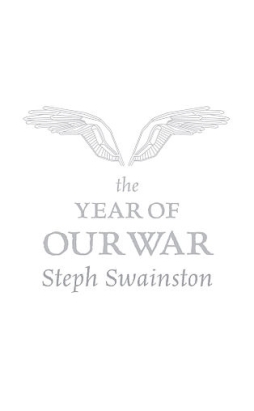 First, some details about the books themselves: They’re secondary-world fantasies, set mostly on a small continent called the Fourlands, which are under attack by a presumably-unintelligent race of giant insects. For hundreds of years the Fourlands have been fighting the insects, under the guidance of the immortal Emperor San. San’s created a Circle of fifty immortals to lead the fight, with each immortal being the best in the Fourlands at a certain skill — but each immortal can be challenged by anyone in the Fourlands, and risk losing their position if the challenger proves to be better at their role.
First, some details about the books themselves: They’re secondary-world fantasies, set mostly on a small continent called the Fourlands, which are under attack by a presumably-unintelligent race of giant insects. For hundreds of years the Fourlands have been fighting the insects, under the guidance of the immortal Emperor San. San’s created a Circle of fifty immortals to lead the fight, with each immortal being the best in the Fourlands at a certain skill — but each immortal can be challenged by anyone in the Fourlands, and risk losing their position if the challenger proves to be better at their role.
We find all this out a bit at a time. We’re thrown into the story abruptly, with minimal exposition. The books are written from the perspective of Comet Jant Shira, the Messenger (each Circle member has their own name, in this case Jant Shira; a title, such as Messenger; and a kind of heroic name typically associated with some meteorological phenomenon: Comet in this case, but also Lightning the Archer, Mist the Sailor, Tornado the Strongman, Serein the Swordsman, and so on). Comet is the child of two semi-human races: an Awian, with vestigial wings, and a Rhydanne, with catlike eyes and a skinny frame. Because of this unusual heritage, his wings aren’t just vestigial — he can actually fly, hence his position as Messenger. Unfortunately, he’s also addicted to a drug named cat, which, when taken in too large a dose, sends his spirit into a place called the Shift, a Burroughsian Interzone between worlds, apparently shaped by puns and allusions.
Stylistically, the books are strong, rich in concrete detail. The descriptions of the Shift seem mannered, and occasionally overcute, but are all in all credibly strange. Some of that strangeness occasionally seems to recur in description of the Fourlands, with unexpected terms and concepts used casually (katanas, blues music, and the like). I think there’s an implied explanation for the use of seemingly out-of-place things in the Fourlands, but more on that later. What I want to say here is that the language of the series is consistently effective — Comet’s point-of-view feels real, feels lived in, and the way he expresses himself is believable.
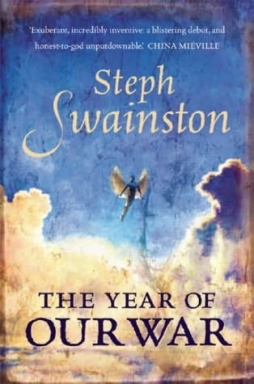 So it’s not the writing that’s the problem; in fact, on balance, I’d say it’s a strength of the book. What about the plot? The more mixed reviews I linked to above noted that the first book, at least, felt oddly unstructured. I think there’s something to that. The plot isn’t defective, as such — everything happens for a logical reason, and for all that the books each cover a lot of ground, there’s something resembling a narrative arc. But there’s not much of a sense of rising and falling action. Stories build, but their working-out doesn’t have any feeling of real consequence. Things happen, but don’t matter.
So it’s not the writing that’s the problem; in fact, on balance, I’d say it’s a strength of the book. What about the plot? The more mixed reviews I linked to above noted that the first book, at least, felt oddly unstructured. I think there’s something to that. The plot isn’t defective, as such — everything happens for a logical reason, and for all that the books each cover a lot of ground, there’s something resembling a narrative arc. But there’s not much of a sense of rising and falling action. Stories build, but their working-out doesn’t have any feeling of real consequence. Things happen, but don’t matter.
The books are in a sense tidy, in the way that they resolve neatly, but never unrealistically so. The first book, The Year of Our War, looks at the internal conflicts among various factions in the immortal Circle and in the Fourlands, and over the book we see them grow and then resolve. No Present Like Time shows us what happens when one of the Circle loses a challenge, then introduces a new country outside the Fourlands, then weaves those two plot points together through the introduction of a rebellion. The Modern World begins with a planned step forward in the battle against the insects, which we soon find actually sets up a terrible reverse — but the whole thing is a kind of backdrop, alternately counterpart and driver of events, for a more personal conflict between one of the Circle and his child. All these things are cleverly done, coherent, quick … and yet oddly undramatic.
To an extent, that lack of drama might be deliberate. Swainston doesn’t seem interested in making things easy on her readers. She avoids infodumps almost entirely, giving us the world as Comet processes it, what strikes his mind as he moves through it — and, as a resident, he’s not surprised by the things that’d surprise us. That’s a strong approach, but sometimes I think it’s poorly handled. Things are left unclear for too long, to no really good purpose. An editorial cartoon mentioned on the first page of the first book, for example, doesn’t really get explained for something like fifty pages, and I at least couldn’t find any benefit to that choice.
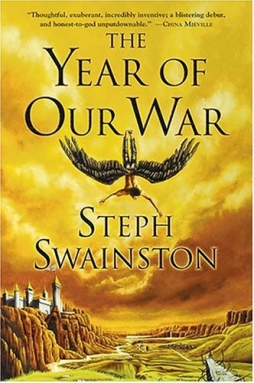 On the other hand, the books work because they capture a kind of hard-edged naturalism in a way that more adventure-oriented books don’t. Good things happen, bad things happen, we watch characters struggle to deal with things, sometimes in good ways and sometimes in bad ways, and the final resolutions sometimes in some ways lead to poetic justice and other times in other ways do not. Crucially, the result feels real, complex, and human, in the way of strong mimetic literature. These books are interesting to consider in the wake of all the discussion of amorality in fantasy fiction around these parts and elsewhere over the preceeding months. You could call them amoral, but then you’d have to call, oh, say, Stephen Crane or Joseph Conrad amoral. There’s no unarguable source or measure of morality within the fictional world, nor does the author have their thumb on the scales telling us what’s right and wrong. Characters do what they feel to be the right thing to do in the moment. The interaction of stated belief, unstated moral codes, self-interest, stupidity, wants acknowledged and unacknowledged — all these things go to make up a character, and the interactions of the characters go to make up the story. And what happens, happens. It has been argued that this sort of absence of clear good and clear evil makes a work flatter, less interesting; I don’t see that that’s necessarily true, and I specifically don’t think that’s the problem here. The fascination of clear morality is replaced, as in mimetic fiction, with the fascination of human character.
On the other hand, the books work because they capture a kind of hard-edged naturalism in a way that more adventure-oriented books don’t. Good things happen, bad things happen, we watch characters struggle to deal with things, sometimes in good ways and sometimes in bad ways, and the final resolutions sometimes in some ways lead to poetic justice and other times in other ways do not. Crucially, the result feels real, complex, and human, in the way of strong mimetic literature. These books are interesting to consider in the wake of all the discussion of amorality in fantasy fiction around these parts and elsewhere over the preceeding months. You could call them amoral, but then you’d have to call, oh, say, Stephen Crane or Joseph Conrad amoral. There’s no unarguable source or measure of morality within the fictional world, nor does the author have their thumb on the scales telling us what’s right and wrong. Characters do what they feel to be the right thing to do in the moment. The interaction of stated belief, unstated moral codes, self-interest, stupidity, wants acknowledged and unacknowledged — all these things go to make up a character, and the interactions of the characters go to make up the story. And what happens, happens. It has been argued that this sort of absence of clear good and clear evil makes a work flatter, less interesting; I don’t see that that’s necessarily true, and I specifically don’t think that’s the problem here. The fascination of clear morality is replaced, as in mimetic fiction, with the fascination of human character.
At the same time, I suspect some of my problems with the book may lie with its character work, especially the character of Comet. He’s thought-through, in that his past informs his present, and in that how he sees himself is clearly different from how he’s seen by those around him. But he doesn’t seem particularly deep. Perhaps it’s a function of being frozen in his early 20s. He’s still, and forever, concerned with being cool. At any rate, you can see how events in his past shape him, you can see why he is the way he is; but you see it too clearly. There’s a quality of richness missing, a quality of the unexpected.
Which seems to extend itself to the other characters of the books. Comet, our observer, doesn’t make them interesting. To Comet, they’re probably not very interesting, not as compared to himself. But it’s not clear that he really understands them deeply enough to describe them as fully-rounded characters, even if he was interested in doing so. And, practically, I think he watches them from too great a distance. The books are mostly built around the complex schemes of various members of the Circle, or people trying to get into the Circle; Comet’s moderately close to the main figures, but not intimate enough for the schemes to be really significant to him. So events unfold, and Comet watches, and occasionally the plot takes a bump to justify his presence in scenes that require it, and he comes through it all rather less touched than one would like; perhaps it’s for that reason that I as a reader came away untouched as well.
 (One can, incidentally, argue how reliable Comet is as a narrator. I think he may actually be too reliable. Knowing that he’s a junkie, you wait for him to start lying in order to justify his habit; but when a lie he tells his readership about his drugs does come out, it’s fairly minor, and at the end of the third book. You’re expecting something bigger, sooner. But if there is a lie hidden in the text, I missed it.)
(One can, incidentally, argue how reliable Comet is as a narrator. I think he may actually be too reliable. Knowing that he’s a junkie, you wait for him to start lying in order to justify his habit; but when a lie he tells his readership about his drugs does come out, it’s fairly minor, and at the end of the third book. You’re expecting something bigger, sooner. But if there is a lie hidden in the text, I missed it.)
So much for plot and character. What about the setting, which ought to inform them both?
At first, the Fourlands seems aggressively odd, with its winged people and oddly modern items — those katanas and blues songs and T-shirts. It’s as though it were a patchwork of cultures, not something that developed organically. I think that first impression’s misleading, though. There are at least two explanations for the oddities of the Fourlands. To start with, the Shift connects to more worlds than just the Fourlands (and it later becomes clear that Comet isn’t the only character who’s visited the place). So it’s not unreasonable to assume that the more culturally-specific items entered the Fourlands through there.
More broadly, though, the Fourlands aren’t a standard pre-industrial society, for all they may be lacking in firearms and certain other elements of technology. In fact, they represent an alternate development of modernity, one that’s come about through the dictates of an immortal Emperor, and in the face of constant war. I note that Farah Mendlesohn, citing an interview with Swainston, observed in her book Rhetorics of Fantasy that: “Swainston wanted to see how a command economy distorted by the imperatives of war might industrialize, and ended up with a culture in which there are no cars, but the need for military uniforms has produced a basic work outfit not dissimilar to jeans and T-shirts.”
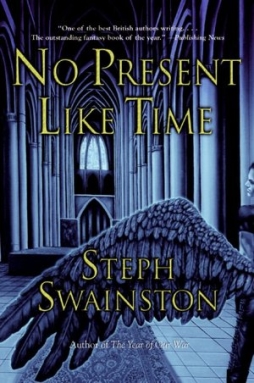 Mendlesohn further suggests that the nature of the economy, the social structure, and the like are major sub-themes of the books. If that’s meant to be so, I think they were too underplayed. You can put the pieces of the puzzle together, and it’s an interesting exercise, but there’s not really the specificity and detail needed to really make the world cohere. The most interesting moment in Swainston’s depiction of her world came when the Fourlanders encounter the new country of the second book, and compare their social system with the new one they’ve discovered — it’s a contrast of utopias, or near-utopias, which is something I don’t remember having read before. But I didn’t feel enough concrete detail had been given to either society to really make the scene everything it could have been.
Mendlesohn further suggests that the nature of the economy, the social structure, and the like are major sub-themes of the books. If that’s meant to be so, I think they were too underplayed. You can put the pieces of the puzzle together, and it’s an interesting exercise, but there’s not really the specificity and detail needed to really make the world cohere. The most interesting moment in Swainston’s depiction of her world came when the Fourlanders encounter the new country of the second book, and compare their social system with the new one they’ve discovered — it’s a contrast of utopias, or near-utopias, which is something I don’t remember having read before. But I didn’t feel enough concrete detail had been given to either society to really make the scene everything it could have been.
Given that their world is important to the characters, it follows that we need to know about it as readers; not only to relate to the world in the same general sort of way as the characters do (though obviously not to the same degree), but also to understand their own relation to the world, as well as how the world has shaped them. And I have my doubts about Comet’s ability to depict the world. I doubt he cares about it as strongly as the other characters do. His concerns seem narrower, more to do with his own interests and the people close to him. That’s a credible choice as far as character-building goes, but tends to shortchange the world as a whole.
It is true that as Messenger he must try to understand and clearly describe what he sees. But it is also true that as Messenger he tends to remain apart from what he observes. So I came away from reading his story knowing a certain amount about the society of the Fourlands, and convinced that there was more to know, but not actually knowing enough about the setting to be involved or answer all the questions I had. Why does religion seem so underdeveloped in the Fourlands, for example? It is clearly true that the dominant faith holds that the world’s been abandoned by God; but what then has replaced God? The Emperor? If so, why is there not more ceremony about him, why is the reverence that others have for him not more apparent? If nothing has replaced God, is a kind of Existentialism the dominant social ideology? And if so, what does that mean for society as a whole?
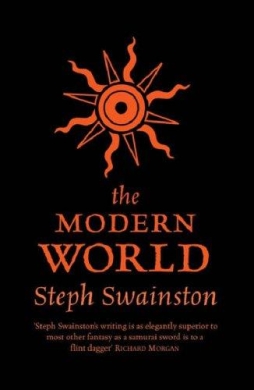 Maybe another observation of Mendlesohn’s unintentionally illuminates some of the problem I have: “Here [in the Castle books] there are at least five stories (I do not mean plot): how to save the world from the invading insects; how to organize an economy for war; how a long war will shape a society; how Jant, a street kid, can maintain his position in the inner circle of the castle; the struggles for power within the inner circle.” These are certainly all concerns of the books (though I think those last two are really only one), but I’m not sure they’re all stories. Put it another way: some of those seeds require more work than others to dramatise effectively. Issues of how a society or economy are to be organised given the concerns they face make interesting questions, but to become stories they need to be fleshed out with characters, conflicts, and the like. To say nothing of a beginning, middle, and end. I don’t think that happens in the three Castle novels, though the matter is potentially there. These are sub-themes, occasionally almost rising to the state of sub-plots, but never developed enough to hold narrative interest on their own.
Maybe another observation of Mendlesohn’s unintentionally illuminates some of the problem I have: “Here [in the Castle books] there are at least five stories (I do not mean plot): how to save the world from the invading insects; how to organize an economy for war; how a long war will shape a society; how Jant, a street kid, can maintain his position in the inner circle of the castle; the struggles for power within the inner circle.” These are certainly all concerns of the books (though I think those last two are really only one), but I’m not sure they’re all stories. Put it another way: some of those seeds require more work than others to dramatise effectively. Issues of how a society or economy are to be organised given the concerns they face make interesting questions, but to become stories they need to be fleshed out with characters, conflicts, and the like. To say nothing of a beginning, middle, and end. I don’t think that happens in the three Castle novels, though the matter is potentially there. These are sub-themes, occasionally almost rising to the state of sub-plots, but never developed enough to hold narrative interest on their own.
Does it matter? There’s enough of a setting there to be going on with. And the setting works with plot and character to develop themes and ideas: how people unify, or do not, in the face of danger; how time shapes people and societies (it’s notable that all the titles have to do with time, and with society or social bonds). There’s one character who grows from child to adult over the course of the books, helping to bring home the passage of years; it sounds simple, but it’s nicely underplayed and highly effective.
But, as I say, Comet’s isolated from the world, isolated by his addiction and his immortality and his perspective as Messenger. The decadence of immortality comes through clearly, but his decadence is dull; more precisely, his wants are dulled through oversatiation. As a lead character, Comet’s uninvolving. He doesn’t care much about the world, so the threat of the insects is unengaging — and so are the other threats and developments that emerge over the books.
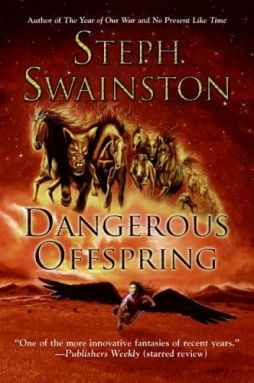 More than that, his stated wants and desires feel unconvincing because he rarely seems to do much to bring them about. Dramatically and structurally, Comet’s a passive character. To judge by his actions, all he wants to do — that is, all that he actually seems to take action to do within the narrative of the books — is serve the Emperor and shoot cat. The second is easily done, since he never seems to have a problem finding any; even if he’s being untruthful in this, it never affects the story that I can see. And while serving the Emperor could present him with potentially powerful conflicts, that never really seems to happen. Some of his duties are distasteful or dangerous, but after relatively mild protest he undertakes them anyway. Readers may be encouraged to doubt the Emperor’s benevolence, but Comet doesn’t; can’t, presumably, or too much of his world would crumble. Which, perhaps, is what therefore ought to have happened. It never does, and Comet goes on passively as the Emperor’s servant.
More than that, his stated wants and desires feel unconvincing because he rarely seems to do much to bring them about. Dramatically and structurally, Comet’s a passive character. To judge by his actions, all he wants to do — that is, all that he actually seems to take action to do within the narrative of the books — is serve the Emperor and shoot cat. The second is easily done, since he never seems to have a problem finding any; even if he’s being untruthful in this, it never affects the story that I can see. And while serving the Emperor could present him with potentially powerful conflicts, that never really seems to happen. Some of his duties are distasteful or dangerous, but after relatively mild protest he undertakes them anyway. Readers may be encouraged to doubt the Emperor’s benevolence, but Comet doesn’t; can’t, presumably, or too much of his world would crumble. Which, perhaps, is what therefore ought to have happened. It never does, and Comet goes on passively as the Emperor’s servant.
Now, passivity in a character, even a main character, is not inherently bad. But if the character is not rich enough to sustain it, and there is no other aspect of the fiction that kicks in to sustain the story, then there’s a problem. I think the result is what you get with the Castle books: well-crafted prose, well-put-together tales, and only sporadic involvement in the stories.
I think there certainly was potential in Comet as a character. The books are clear that in many ways he’s unique in the Fourlands. Partly that’s because he can fly, and so can be a part of the Circle with less fear of being supplanted than any of the other immortals. But it also seems to be because he’s able to access the Shift, which is apparently rare among users of cat. I think there’s something of a missed opportunity there. Comet’s got access to a kind of transcendence that none of the other characters do: he can walk worlds. For that to be meaningful, you need a well-developed sense of reality in the Fourlands; otherwise Comet’s simply stepping out of one kind of weirdness for another kind of weirdness. But the further the books go, the clearer the distinction becomes, and the more I at least wanted to know about the Shift. Certainly the overall plot of the series, especially revelations coming toward the end of the third book, suggest that the Shift is crucial to whatever will end up happening with the war. I don’t want to say that the Shift is underplayed up to that point, but Comet seems uninterested in it, if not over-casual in dealing with it.
 So in the end it seems to me that the dissatisfaction I feel with the books has to do with a fairly sophisticated disjunction between character and world. ‘Sophisticated’ in this case because both elements have to be highly-wrought before the division between them becomes significant. If the world was less individualistic or detailed, Comet’s uninvolvement wouldn’t be a problem. If Comet were less detailed as a character, the curious lack of richness and surprise wouldn’t be a problem, and I suspect the world would have more of an impact upon him — a more traditional character would have a more traditional relationship to the world. But would that relationship be as rewarding as the flawed-but-intriguing relationship we do get?
So in the end it seems to me that the dissatisfaction I feel with the books has to do with a fairly sophisticated disjunction between character and world. ‘Sophisticated’ in this case because both elements have to be highly-wrought before the division between them becomes significant. If the world was less individualistic or detailed, Comet’s uninvolvement wouldn’t be a problem. If Comet were less detailed as a character, the curious lack of richness and surprise wouldn’t be a problem, and I suspect the world would have more of an impact upon him — a more traditional character would have a more traditional relationship to the world. But would that relationship be as rewarding as the flawed-but-intriguing relationship we do get?
Again, I want to emphasise that these are fine books. They may not be to every reader’s taste, but what books are? They’re well-written, the language precise, the prose rhythms varied, with several passages — notably those in the Shift — easily changing register to handle greater strangeness. I’m going to look for the fourth book in the series, and hope for a fifth. Let Swainston take the time she needs. None of us are immortal, but surely we can wait a few years between books.
Matthew David Surridge is the author of “The Word of Azrael,” from Black Gate 14. His ongoing web serial is The Fell Gard Codices. You can find him on facebook, or follow his Twitter account, Fell_Gard.
I wanted to love Year of Our War. There was enough about it that I liked, I almost read the second book, but when I found out Comet relapsed in his addiction, a wave of boredom overwhelmed me. Though the Shift is a cool idea, addiction is really tedious. Comet was at his most tedious when he was acting like a plausible junkie. If shooting cat is the only way into the Shift, and the Shift is crucial to saving the Fourlands, then I can see how it would be necessary to the plot for him to relapse. It’s just that it also made it unnecessary for me to keep reading.
Your essay was very helpful. I can now say the series was probably never going to be engaging to me as a reader, shrug, and move on with my TBR list.
I do hope Swainston writes more books when eventually she’s done with the Castle series. What’s awesome about her is very, very awesome.